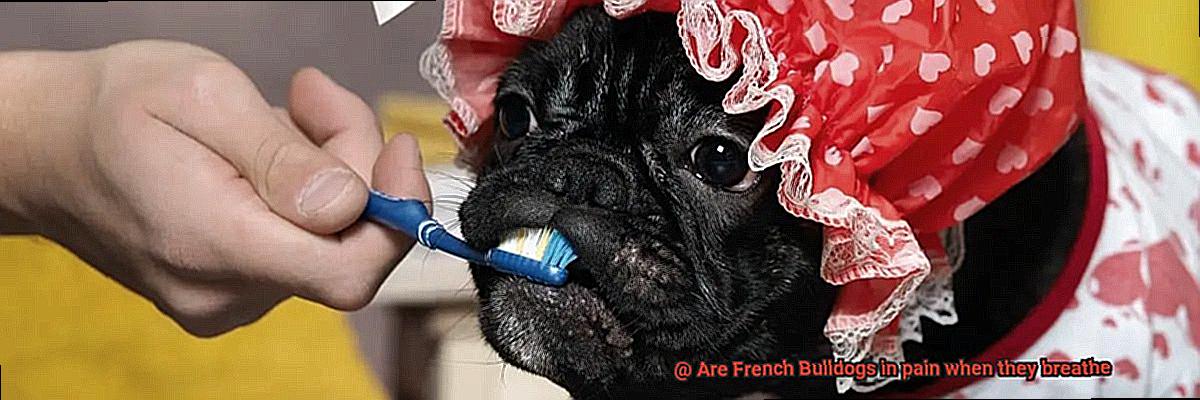Are French Bulldogs in pain when they breathe?
Today, we’re diving deep into the world of our adorable French Bulldogs – those squishy-faced cuties with hearts full of mischief. But wait, there’s a hitch in their breathing pattern that has us all on edge. Are these little rascals actually in pain when they take a breath? Let’s peel back the layers and find out.
French Bulldogs have their own unique set of challenges when it comes to breathing. It’s like solving a puzzle to figure out what’s causing their discomfort. In this blog post, we’ll unravel the mystery by combining expert knowledge with real-life stories. Get ready for a rollercoaster ride as we explore the potential culprits behind their labored breathing and discover ways to help them find sweet relief.
So, buckle up, folks. We’re about to embark on an investigative journey that will shed light on why our furry friends struggle to breathe freely. Together, let’s uncover the truth and give these lovable pooches the comfort they deserve.

Understanding French Bulldogs’ Anatomy and Potential Pain
Contents
- 1 Understanding French Bulldogs’ Anatomy and Potential Pain
- 2 Common Signs of Respiratory Difficulty in French Bulldogs
- 3 How to Recognize Respiratory Distress in French Bulldogs
- 4 Treatment Options for Breathing Problems in French Bulldogs
- 5 Preventive Measures for Managing Breathing Issues in French Bulldogs
- 6 The Importance of Regular Veterinary Check-ups for French Bulldogs
- 7 Should You Be Concerned if Your French Bulldog Is Breathing Unusually?
- 8 How to Support Your French Bulldog’s Respiratory Health
- 9 Conclusion
French Bulldogs are beloved companions known for their distinctive appearance and endearing personality. However, their unique anatomy can pose challenges when it comes to breathing, potentially leading to discomfort and pain. In this article, we will delve into the anatomy of French Bulldogs and explore how it can contribute to breathing difficulties. By understanding these factors, we can better care for our furry friends and ensure their well-being.
Anatomy and Breathing Challenges:
Narrow Nostrils (Stenotic Nares):
French Bulldogs have narrow nostrils, which restricts airflow through their nasal passages. This can make it harder for them to breathe freely, especially during physical exertion or in warm weather. Signs of labored breathing include snorting sounds and excessive panting.
Elongated Soft Palate:
The soft palate at the back of a French Bulldog’s mouth can be too long, obstructing the airway and causing difficulty in breathing. This may result in snoring, choking, or gagging episodes.
Small Windpipe (Trachea):
French Bulldogs have a narrow windpipe, making it more challenging for them to take in sufficient amounts of air. This can be particularly noticeable during exercise or moments of excitement.
Laryngeal Collapse:
Laryngeal collapse occurs when the cartilage structures in a French Bulldog’s larynx weaken and collapse inward during inhalation. This further obstructs the airway and exacerbates breathing difficulties.
Signs of Pain and Discomfort:
French Bulldogs experiencing breathing difficulties may exhibit signs of pain or discomfort, including:
- Snorting or snoring sounds
- Excessive panting
- Wheezing or coughing
- Fatigue or reduced stamina
When to Seek Veterinary Care:
It is crucial to monitor your French Bulldog’s breathing patterns and seek veterinary care if you notice any of the following signs:
- Abnormal breathing sounds
- Excessive panting, especially at rest
- Difficulty recovering from exercise or physical exertion
- Bluish gums or tongue
- Collapsing or fainting episodes
Common Signs of Respiratory Difficulty in French Bulldogs
As a French Bulldog owner, it’s important to be aware of the common signs of respiratory difficulty so you can seek veterinary attention if needed. Here are some signs to watch out for:
- Loud and Excessive Snoring: French Bulldogs are notorious snorers, but if your Frenchie’s snoring becomes unusually loud or excessive, it could be a sign of respiratory difficulty. This can occur both during sleep and when the dog is awake.
- Wheezing or Raspy Breathing: If you hear your Frenchie wheezing or breathing with a raspy sound, it may indicate a problem with their airways. This can be heard when the dog inhales or exhales.
- Difficulty Breathing: Rapid and shallow breaths, excessive panting, or a struggling to catch its breath are all signs of respiratory distress in French Bulldogs. You may notice your Frenchie having trouble breathing after physical activity or excitement.
- Coughing or Gagging: French Bulldogs with respiratory difficulties may exhibit coughing or gagging, especially after physical activity or excitement. This can be a result of narrowed airways or an irritated throat.
- Bluish Tint: Pay attention to the color of your Frenchie’s gums and tongue. If they have a bluish tint, known as cyanosis, it means there is not enough oxygen in their blood and is a serious indicator of respiratory distress.
It’s important to remember that these signs can vary in severity and may worsen under certain conditions, such as hot weather or high levels of physical exertion. If you notice any of these signs in your French Bulldog, it is crucial to seek veterinary attention immediately. Respiratory difficulties can quickly become life-threatening if left untreated.
How to Recognize Respiratory Distress in French Bulldogs
French Bulldogs are adorable and lovable companions, but they can also be prone to respiratory issues due to their unique anatomy. As a responsible owner, it is crucial to be able to recognize the signs of respiratory distress in your furry friend so that you can seek immediate veterinary attention. Let’s dive into the key points to consider when it comes to identifying respiratory distress in French Bulldogs.
-
Labored Breathing: One of the most obvious signs of respiratory distress is labored breathing. If your French Bulldog is struggling to breathe, you may notice rapid, shallow breaths or excessive panting. They may also make unusual sounds such as wheezing, snorting, or gasping for air. It’s like they’re trying to blow bubbles underwater but can’t catch their breath.
- Cyanosis: Another important indicator of respiratory distress is cyanosis. This fancy word refers to a bluish tinge in the gums, tongue, or other mucous membranes. It’s like your dog’s body is turning into a smurf. But on a serious note, this occurs when there’s a lack of oxygen in the blood and can be a sign of serious respiratory issues.
- Noisy Breathing: French Bulldogs are known for their unique snorting and snoring sounds. It’s like having a little piggy running around the house. However, if you notice an increase in these noises or any new, abnormal sounds during breathing, it could be a sign of respiratory distress. It’s like your dog is auditioning for a role in a symphony orchestra.
- Restlessness and Anxiety: Dogs experiencing respiratory distress may exhibit restlessness and anxiety. They may pace, have difficulty lying down comfortably, or appear agitated. It’s like they’re doing a dance routine and can’t find the right rhythm. This could be due to the discomfort they feel while trying to breathe properly.
- Fatigue and Weakness: Respiratory distress can also lead to fatigue and weakness in French Bulldogs. They may become lethargic, have difficulty exercising, or show a decrease in overall activity levels. It’s like they’re participating in a marathon without proper training.
- Increased Respiratory Rate: Monitoring your French Bulldog’s respiratory rate can provide valuable information about their breathing patterns. An increased respiratory rate at rest or during minimal activity can indicate respiratory distress. It’s like they’re trying to catch their breath after climbing Mount Everest.
- Nasal Discharge: Keep an eye out for any abnormal nasal discharge in your French Bulldog. If you notice excessive mucus, blood, or a foul odor, it could be a sign of respiratory distress or infection. It’s like they’re sneezing out a rainbow of colors.
Treatment Options for Breathing Problems in French Bulldogs
Here, we’ll dive into the world of treatment options available for French Bulldogs experiencing breathing problems. So sit back, relax, and let’s get started.
Medication:
When it comes to managing breathing problems, medication can often be a game-changer. Your veterinarian may prescribe bronchodilators to open up those airways, anti-inflammatory drugs to reduce inflammation, or antibiotics to fight respiratory infections. Just like superheroes, these medications can come to the rescue and improve your Frenchie’s breathing.
Weight management:
We all know how important it is to maintain a healthy weight, and the same goes for our furry friends. Obesity can worsen breathing difficulties in French Bulldogs, so your vet might recommend a customized weight management plan. Don’t worry; it’s not about putting your Frenchie on a strict diet – it’s more like encouraging exercise and providing a balanced diet to help them shed those extra pounds.
Surgical intervention:
For more severe cases, surgical intervention may be necessary. Procedures such as soft palate resection or nasal surgery can widen air passages and alleviate breathing difficulties. Think of it as giving your Frenchie a little breathing makeover.
Environmental modifications:
Creating an environment that promotes easier breathing is essential. Adding moisture to the air with a humidifier can help combat dryness, while avoiding smoke and strong chemicals can reduce irritants. And don’t forget good ventilation – fresh air is key.
Breathing exercises:
Yes, you read that right – even dogs can benefit from breathing exercises. Some veterinarians recommend specific exercises to strengthen respiratory muscles in French Bulldogs. It’s like going to the gym for their lungs – a little huffing and puffing can go a long way.
Regular veterinary check-ups:
Keeping up with regular check-ups is crucial to monitor your Frenchie’s progress and make any necessary adjustments to their treatment plan. Your vet will be your trusty sidekick on this journey to better breathing.
Holistic approaches:
If you’re open to alternative treatments, options like acupuncture or herbal remedies might pique your interest. Just remember to talk to your vet first to ensure they’re safe and effective choices for your Frenchie.
Preventive Measures for Managing Breathing Issues in French Bulldogs
French Bulldogs are adorable little companions with a charm that can melt anyone’s heart. However, their unique brachycephalic (flat-faced) anatomy can make them prone to breathing issues. As a responsible owner, it is crucial to take preventive measures to manage and alleviate these problems, ensuring your furry friend’s comfort and overall well-being. Here are some tips and tricks to help you be your French Bulldog’s breathing hero:
- Maintain a healthy weight: Just like humans, obesity can worsen breathing problems in French Bulldogs. Feed them a balanced and appropriate diet, avoiding excessive treats or table scraps. Aiming for a lean physique will make their breathing easier and improve their overall health.
- Get moving: Regular exercise is essential for managing breathing issues. Take daily walks or engage in playtime to improve their fitness and respiratory function. However, avoid strenuous activities that can overexert them and strain their breathing further.
- Keep it fresh: Providing a well-ventilated environment is crucial. Make sure your French Bulldog has access to fresh air and cool temperatures, especially during hot weather. Avoid exposing them to extreme heat or allowing them to exert themselves excessively in high temperatures, as it can lead to heatstroke and worsen their breathing difficulties.
- Say no to smoke: Secondhand smoke is a big no-no for French Bulldogs with breathing issues. Smoke inhalation can irritate their airways and worsen respiratory symptoms. Keep the environment smoke-free and away from any smoking individuals or areas.
- Grooming matters: Regular grooming plays a pivotal role in managing breathing issues. Keep their facial folds clean and dry to prevent skin infections that can obstruct their airways. Additionally, regularly clean their ears and trim their nails to enhance their comfort while breathing.
- Consider surgical intervention: In severe cases of brachycephalic airway syndrome, surgery may be necessary to correct anatomical abnormalities and improve breathing. However, this should only be considered after consulting with a veterinarian and carefully weighing the risks and benefits.
- Regular veterinary check-ups: Stay on top of your French Bulldog’s health by scheduling regular check-ups. Your vet can monitor their respiratory function, provide guidance on preventive measures, and recommend appropriate treatments or interventions if necessary.
- Recognize respiratory distress: Educate yourself about the signs of respiratory distress and know when to seek immediate veterinary care. Rapid or labored breathing, excessive panting, bluish gums or tongue, collapsing episodes, or any other signs of severe breathing difficulty should not be ignored and require immediate attention.
The Importance of Regular Veterinary Check-ups for French Bulldogs
French Bulldogs are undeniably adorable and lovable companions. But behind their charming appearance lies a breed that is prone to certain health issues, particularly those related to their respiratory system. As a responsible French Bulldog owner, it is crucial to understand the importance of regular veterinary check-ups for your furry friend.
Breathing problems are one of the most common concerns with French Bulldogs. Their unique physical characteristics, such as their short snouts and narrow nostrils, make it harder for them to take in enough air. This can lead to breathing difficulties and potential pain. Regular veterinary check-ups allow veterinarians to closely monitor the respiratory health of French Bulldogs and identify any potential issues early on.
During a regular check-up, your veterinarian will listen to your dog’s breathing sounds, check for any signs of labored breathing or wheezing, and assess the overall condition of the respiratory system. These examinations are vital in detecting and addressing breathing problems promptly, which can alleviate pain and discomfort in your French Bulldog.
In some cases, further diagnostic tests such as x-rays or endoscopy may be recommended to get a closer look at the airways and identify any abnormalities that may be causing pain or discomfort. Your veterinarian may also discuss preventive measures with you, such as weight management and exercise limitations, to minimize stress on your French Bulldog’s respiratory system.
Regular veterinary check-ups provide an opportunity for you to collaborate with your veterinarian in ensuring the well-being of your French Bulldog. By staying proactive and keeping up with these check-ups, you become your furry friend’s breathing hero.
Here are some key reasons why regular veterinary check-ups are essential for French Bulldogs:
- Early detection: Regular check-ups allow veterinarians to catch any potential respiratory issues early on before they progress into more severe conditions.
- Pain management: Breathing problems can be painful for French Bulldogs. By addressing these issues promptly, veterinarians can help alleviate their discomfort and improve their quality of life.
- Preventive measures: Veterinarians can provide guidance on preventive measures to minimize stress on your French Bulldog’s respiratory system, such as weight management and exercise limitations.
- Collaboration and support: Regular check-ups provide you with an opportunity to discuss any concerns or questions you may have about your French Bulldog’s health. Your veterinarian is there to support you and provide expert advice tailored to your dog’s specific needs.
As a French Bulldog owner, it is your responsibility to prioritize the health and well-being of your furry friend. Regular veterinary check-ups play a vital role in ensuring that your French Bulldog receives the necessary care and attention for their respiratory health. By staying proactive and working closely with your veterinarian, you can help your French Bulldog live a happy and comfortable life. So, don’t wait any longer. Schedule that check-up and become your French Bulldog’s breathing hero today.
Should You Be Concerned if Your French Bulldog Is Breathing Unusually?
These flat-faced pooches have a unique respiratory system that can make breathing a little more challenging for them compared to other dog breeds. However, it’s essential to monitor your French Bulldog’s breathing patterns and be aware of any changes or abnormalities. Here’s why:
- Normal vs. Abnormal: It’s important to understand what is considered normal for French Bulldogs regarding their breathing. Some degree of snorting, snoring, or wheezing is common due to their brachycephalic features. However, if you notice unusually loud or labored breathing, it could be a sign of respiratory distress or an underlying health issue.
- Potential Red Flags: Keep an eye out for certain symptoms that may indicate a problem with your French Bulldog’s breathing. Excessive panting, shallow breathing, gasping for air, or struggling to breathe are all red flags that require attention. These symptoms could signify conditions such as heatstroke, allergies, respiratory infections, or even more serious issues like brachycephalic airway syndrome or heart disease.
- Early Detection is Key: Monitoring your French Bulldog’s breathing patterns and being proactive can make a significant difference in their overall health and well-being. By detecting potential problems early on, you can seek veterinary care promptly and prevent further complications.
- Maintaining Respiratory Health: While some respiratory challenges are inherent to the breed, there are steps you can take to promote good respiratory health in your French Bulldog. Keep them at a healthy weight to reduce strain on their airways, provide a well-ventilated environment, avoid exposing them to smoke or other respiratory irritants, and be cautious with strenuous exercise in hot weather.
Remember, no one knows your French Bulldog better than you do. If you notice any concerning breathing patterns or symptoms, don’t hesitate to consult your veterinarian. They can provide the necessary guidance and treatment to ensure your furry friend’s comfort and well-being.
How to Support Your French Bulldog’s Respiratory Health
French Bulldogs are adorable and beloved pets, but their unique physical characteristics can make them more prone to respiratory issues. As responsible pet owners, it is important to take proactive steps to support their respiratory health. Here are some tips to help keep your French Bulldog breathing comfortably.
Understand their anatomy
French Bulldogs are brachycephalic dogs, which means they have a flat face and a shortened upper airway. This anatomical feature can lead to breathing difficulties and potential pain for your furry friend.
Recognize the signs
Watch out for signs of respiratory distress in your French Bulldog, such as excessive panting, wheezing, coughing, or fatigue. These symptoms may indicate that they are struggling to breathe properly and should be evaluated by a veterinarian.
Maintain a healthy weight
Obesity can worsen respiratory problems in French Bulldogs. Keep your pup at a healthy weight by providing a balanced diet and portion control. Consult with your veterinarian to determine the appropriate diet for your Frenchie, considering their specific needs and any potential allergies.
Create a safe environment
Keep the air quality clean and free from irritants such as smoke, dust, and strong chemicals. Regularly dusting and vacuuming your home can help minimize these irritants. Additionally, avoid exposing your French Bulldog to extreme temperatures, especially heat, as this can put additional stress on their breathing.
Provide gentle exercise
Exercise is crucial for your French Bulldog’s overall health but be mindful of their limitations due to their brachycephalic condition. Avoid excessive exercise or activities in hot weather, as this can put additional strain on their breathing.
Regular veterinary check-ups
Schedule regular check-ups with your veterinarian to monitor your French Bulldog’s respiratory health. Your vet can detect any early signs of respiratory issues and provide appropriate treatment or management strategies.
Conclusion
In conclusion, it is evident that French Bulldogs may experience pain when they breathe.
This is primarily due to their brachycephalic (short-nosed) anatomy, which can lead to a range of respiratory issues. The flat faces and narrow airways of French Bulldogs make it difficult for them to inhale and exhale properly, causing labored breathing and potential discomfort.
Additionally, their elongated soft palates can obstruct the airway, further exacerbating their breathing difficulties. These physical characteristics put French Bulldogs at a higher risk of developing respiratory problems such as snoring, wheezing, coughing, and even potentially life-threatening conditions like Brachycephalic Obstructive Airway Syndrome (BOAS).
Regular veterinary check-ups, maintaining a healthy weight, providing adequate exercise, and avoiding extreme temperatures are some steps that can help alleviate any potential pain or discomfort associated with breathing difficulties in French Bulldogs.




